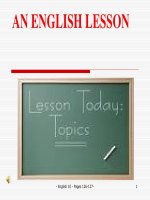Unit 12: A.Reading
Bạn đang xem bản rút gọn của tài liệu. Xem và tải ngay bản đầy đủ của tài liệu tại đây (366.64 KB, 12 trang )
Cau Ke High School
•
Teacher:Hu nh T ng Ng c Trâmỳ ố ọ
What do you think of the teacher?
What is this class different from
your class?
1.Where do you think the classes are?
a.In mountainous areas.
b.In remote areas
c.In developing areas
d.In the cities
2. What do you think of the people in the classes?
a.They are at the same age.
b.They don’t have conditions to go to school
c.They are all kinds of ages.
d.a and b
To know more about them,let’s study Unit 5
I/ BEFORE READING
A. Look at the picture in textbook and
choose the best answer
Unit 5:Illiteracy
A. Reading
•
I/ BEFORE READING
•
B. Match the phrases with their suitable Vietnamese
meaning
•
1. What do you think of the teacher?
•
a. He got a regular training in teaching.
•
b. He is a tutor
•
c. He just works as a volunteer to teach the children to
read and write.
•
d. He is the teacher at this school
•
2. What are these classes different from your class?
•
a. The children wear uniform
•
b. The material facilities of the class are simple and in
privation and the students don’t have uniform.
•
c. The children are provided books and the best things to
support their studying
•
d. the room is in the best condition.
Task 1
B. Match the phrases with their suitable
Vietnamese meaning
1. Universalisation of
Primary Education:
2. The Vietnam Society of
Learning Promotion:
3. illiteracy eradication:
4. farming techniques:
5. family planning:
a. xoá mù chữ
b. K thuat canh tácỹ
c. Ph c p giáo d c ti u h cổ ậ ụ ể ọ
d. K ho ch hoá gia đìnhế ạ
e. H i khuy n h c Vi t ộ ế ọ ệ
Nam
II/ WHILE READING
Task 2
•
Which of the choices A, B, C, D most
adequately sums up the whole passage?
a. Ethnic minority students’ education programme
b. Illiteracy rates in Vietnam
c. The fight against illiteracy
d. The programme of “Universalisation of Primary
Education:” inViet nam
Task 3: Answer the questions
1) 94% of the population
2) The campaign for illiteracy eradication
3) 600 students in 2000 and 800 students in 2001
4) They voluntarily spent their vacations
5) Illiteracy will soon be eradicated
6) What did the students talk about at their classes?
They talked about new farming techniques and family
planning.
III/ AFTER READING
•
Discuss in groups:
1. Are there any illiterate people in your neighborhood?
2. How many people are there?
3. What do you think we should do to help them read
and write?
•
We should take part in teaching them to read and
write every summer vacation or anytime we have
free time. Besides, we should give them books,
notebooks, pens or money to support their studying.
•
* Home Work:
•
Write a short a paragraph about illiteracy eradication
in your neighborhood and your contribution to
reduce illiteracy using suggestions in “ After you
read”
•
Rewrite the tasks
•
Prepare next lesson:B.Speaking
•
Good Bye!
•
See you again!









